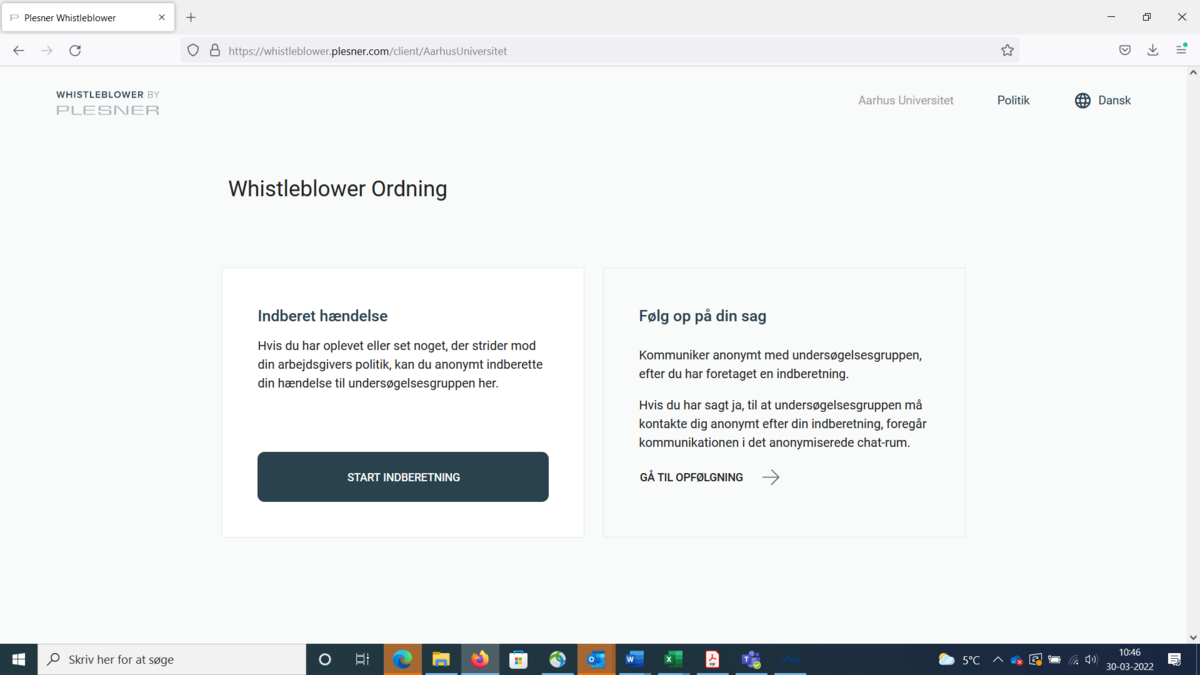The whistleblower scheme has gone live and is being used
In the middle of December, Aarhus University's whistleblower scheme came into force. It provides employees and collaborative partners with the opportunity to report criminal offenses, gross harassment and other forms of wrongdoing. Three cases have been reported since the scheme was introduced.
If you have experienced criminal offences, misuse of funds, breaches of EU law or gross harassment, it is possible to report them using Aarhus University's whistleblower scheme. The scheme, which stems from an EU directive, is designed to ensure that all employees and partners have the opportunity to report irregularities. When a report is submitted, it is initially sent via an external IT system to the law firm Plesner, who then forward the complaint to specially created whistleblower units at the university.
FACTS
The aim of the scheme is to ensure:
- that a whistleblower is able to, quickly and confidentially via a special independent channel, report breaches or potential breaches covered by the Whistleblower Act.
- that an impartial and independent whistleblower unit assesses which measures are needed.
Who can file a report:
- Employees.
- Self-employed persons.
- Members of the senior management team and the board.
- Volunteers.
- Paid or unpaid interns.
- Persons working under the supervision and direction of contractors,
suppliers and sub-suppliers. - Persons who report or publicly disclose information acquired in a work-based relationship that has since ended.
- Persons whose work-based relationship is yet to begin and who report information on breaches that they have obtained during the recruitment process or other pre-contractual negotiations.
What can be reported:
- Criminal offences
- Breach of confidentiality
- Misuse of funds
- Theft
- Fraud
- Embezzlement
- Deceit
- Bribery
- Work safety breaches
- Any form of sexual harassment
- Gross harassment, e.g. bullying, violence and harassment due to race or political or religious affiliation.
- Serious or repeated violations of the principles of administrative law, including the inquisitorial principle, requirements for objectivity, the misuse of powers doctrine and proportionality.
- Deliberately misleading information.
- Serious offences under EU law within a number of specific areas, including:
- Public calls for tender
- Money laundering
- Product Safety
- Transport safety
- Food and feed safety
- Animal health and welfare
- Environmental protection
- Public Health
- Consumer protection
- Protection of privacy and personal data
- Network and information system security
Used three times
Since the scheme began, it has been used three times. After each report, the university has three months to investigate the matter and inform the whistleblower of their findings. Some cases can be dealt with internally, while more serious cases may ultimately be reported to the police.
It is possible to report both anonymously, so that only the Plesner law firm is aware of the identity of the whistleblower, or with double anonymity, in which case neither Plesner nor the university are aware of the complainant's identity. Anonymity is also maintained for any access to documents. In the event of double anonymity, the whistleblower is, however, responsible for regularly logging onto the system to see if there are any follow-up questions or responses to the reporting in the system. If any questions are not answered, a report may be shelved.
The criteria for which matters may give rise to a report are not set in stone. However, the whistleblower scheme is intended for serious matters, such as: Misuse of funds, bribery, fraud, gross harassment, breaches of legislation or of EU law, theft, breach of confidentiality or repeated violations of administrative law principles.
When Plesner receives a report, the law firm conducts an assessment of whether the case falls within the framework. Irrespective of the assessment, all reports are sent to the university and the specially created whistleblower units. The units are staffed by lawyers from the Rector's office, representatives from the faculty in question and employees from AU HR. All members of the units are subject to special confidentiality requirements regarding the reports under the whistleblower scheme. In cases where the report from the whistleblower has to do with the Rector's Office, including the senior management team, Plesner will send the report directly to AU HR, who will then consider the case.
Open to many, but not students
The whistleblower scheme is wide-ranging in scope. All employees, both current and previous, may make use of the scheme. This is also the case for collaborative partners, suppliers and persons affiliated with AU as volunteers or honorary officers. PhD students who are under contract with the university, students with student jobs at the university, or students who work voluntarily, can also make complaints.
However, students who do not have other forms of affiliation are not covered by the scheme. This is because it is not possible to ensure students’ anonymity and confidentiality – and thereby their anonymity – under the Whistleblower Act. Instead, they have the opportunity to find help via e.g. student counsellors, department heads or directors of studies at the departments.
Annual overview of reports
The university is required to publish an annual overview of reports. The first status is expected to be published around the new year, im the overview it will be possible to see how many reports have been submitted, how many have been completed, how many have been reported to the police and how many have been shelved. The overview will also state the overall themes of the reports.
Contact:
Administrative officer & LLM Bente Skou Paulsen
The Rector’s Office
Email: bsp@au.dk
Tel.: (+45) 4087 9163
